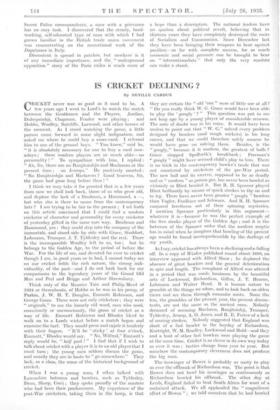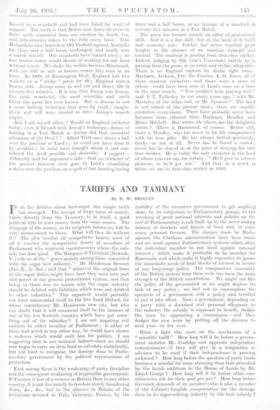IS CRICKET DECLINING ?
By NEVILLE CARDUS
CRICKET never was as good as it used to be. A few years ago I went to Lord's to watch the match between the Gentlemen and the Players. Jardine, Duleepsinhji, Chapman, Fender were playing ; and Hobbs, Woolley, Sutcliffe, Larwood, and other heroes of the moment. As I stood watching the game, a little parson came forward in some slight indignation, and asked me where he could buy a score-card; I referred him to one of the ground boys. " You know," said he, " it is absolutely necessary for one to buy a card now- adays ; these modern players are so much alike—no personality I " To sympathize with him, I replied : " Ah, Sir, there are no Ranjitsinhjis and 'Maclarens at the present time ; no Jessops." He positively snorted : " No Ranjitsinhjis and Maclarens ? Good heavens, Sir, the game had gone long before then ! "
I think we may take it for granted that in a few years from now we shall look back, those of us who grow old, and deplore the lack of a Bradman, a Hammond, a —, but who else is there to name from the contemporary lists ? I am trying to be fair to the present ; I set forth on this article convinced that I could find a modern cricketer of character and personality for every cricketer of yesterday gifted in the same rare way. Bradman and Hammond, yes : they could step into the company of the immortals,• and .stand, side by side with Grace, Stoddart, Lohmann, Trumper, J. T. Tyldesley and the rest, There is the incomparable Woolley left to us, too ; but he belongs to the Golden Age, to the period of before the War. For the life of me, and devoted for ever to cricket though I am, in good years or in bad, I cannot today see on our cricket fields the rich nature, the strong indi- viduality, of the past—and I do not hark back for my comparisons to the legendary years of the Grand Old Man and Peel and Briggs and Arthur Shrewsbury., Think only of the Maurice Tate and Philip Mead of 1924 or thereabouts, of Hobbs as he was in his pomp, of Parkin, J.. W. H. T. Douglas, Emmott Robinson, and George Gunn. These were not only cricketers ; they were " originals," to use the homely old word, men who used, consciously or unconsciously, the game of cricket as a way of life. Emmott Robinson and Rhodes, liked to walk on to a Leeds wicket before a match began and examine the turf. They would press and cajole it tenderly with their fingers. " It'll be ' sticky ' at four o'clock, Emmott," Rhodes would say. " No, Wilfred," Emmott's reply would be, " half past ! " I find that if I wish to talk about cricket with a player it is to an'old player that I must turn ; the young men seldom discuss the game, and usually they are in haste to go somewhere." They lack, as a class, the sense of the historical background of cricket.
When I was a young man, I often talked with Lancashire batsmen and bowlers, such as Tyldesley, Dean, Sharp, Cook ; they spoke proudly of the masters who had been their predecessors. My experience of the post-War cricketers, taking them in the lump, is that they are certain the " old 'uns " were of little use at all ! " Do you really think W. G. Grace would have been able to play the ' googly ' ? " This question was put to me not long ago by a young player of considerable renown. The note of doubt was in his voice. It would have been useless to point out that " W. G." solved every problem designed by bowlers (and rough wickets) in his long career, and that we could therefore safely assume he would have gone on solVing them. 'Besides, is the " googly," because it is modern, the greatest. of balls ? Grace stopped Spofforth's breakback.; Freeman's " googly " might have seemed child's play to him. There is no trick in the contemporary bowler's trade that was not countered by cricketers of the pre-War period. The new ball and its swerve, supposed to be as deadly and as " modern " as poison gas, has never been bowled as viciously as Hirst bowled it. But R. H. Spooner played Hirst brilliantly by means of quick strokes to thg on and to leg. There have never been greater " googly " bowlers than Vogler, Faulkner and Schwarz. And R. H. Spooner conjured loveliness out of their spinning mysteries. I mention Spooner particularly in this argument-L- whatever it is—because he was the perfect example of the free stroke player of the Golden Age ; and it is the batsman of the Spooner order that the modern sceptic, has in mind when he imagines that bowling of the 'present age would be found incomprehensible by the darlings of my youth.
As I say, cricket has always been a-declining and a-falling off. In a copy of TVisden published round about 1899, an interview appeared with Alfred Shaw ; he deplored the absence of great bowlers and the general deterioration. in spin and length. The complaint of Alfred was uttered in a period that was made luminous by the beautiful. arts of Lockwood, Richardson, Giffen, J. T. Hearne, Lohmann and Walter Mead. It is human nature to grumble at the things we adore, and to look back on olden times and see them through romantic mists. None the less, the grumbles of the present year, the present discon- tents, arc not the same as the ancient ones. Nobody dreamed of accusing Maclaren, Ranjitsinhji, Trumper, Tyldesley, Jessop, A. 0. Jones, and R. E. Foster of a lack of scoring strokes. Nobody suggested that England was short of a fast bowler in the heyday of Richardson, Kortright, W. M. Bradley, Lockwood and Mold—and they and a host of other fast bowlers were playing the game at the same time. Cricket is as clever in its own way today as ever it was ; 'tactics change from year to year. But somehow the contemporary cleverness does not produce, the big man.
The inswinger of Bowes is probably as nasty to play, as ever the offbreak of Richardson was. The point is that Bowes does not bowl his inswinger as continuously as Richardson bowled his offbreak. The other day at Leeds, England failed to beat South Africa for want of a sustained attack. We all applauded the " magnificent effort of Bowes " ; we told ourselves that he had bowled himself to a standstill and had been foiled by want of support. The truth is that Bowes. 'sent down 19 ovens in three spells 'separated '.from • one 'another by lunch, tea, and refreshments taken to the field every hour. Toni Richardson 'onde bawled at Old Trafford against Australia for three and a half hours 'unchanged, and nearly won a . match himself. Our Standards' have turned awry ; no fast bowler today would dream of working for one hour without a rest. • We shake the welkin beeariSe. HammOnd, with his side as safe as houses, scores fifty runs in an hour. In 1899, at Kennington Oval, England lost five wickets on a " sticky " pitch for 48 England were a beaten side. Jessop came in and cut!and"droVe 105 in seventy-five minutes. It is true that Jessop was Jessop, the most wonderful, the most scientific and swift hitter the, game has ever known. But a Jessop is not a , mere batting technique that goes by -itself ; imagin- al( n and will were needed to drive Jessop's superb engine, • And I ask myself often,- " Would an England cricketer today, even if blessed with Jessop's technique, dream of batting in a Test Match as Jessop did. that immortal afternoon at the Oval ? ". Albert Trott once drove a ball over the pavilion at • Lord's.; he could not have done it by accident ; he . must have thought about • it and con- sidered the deed possible • and desirable. • I suggest- . diffidently and for argument's sake—that no cricketer of the present moment ever goes to Lord's visualizing a drive over the pavilion, or a spell of fast bowling lasting three and a half hours, or an innings of a hundred in seventy-five minutes in a Test Match. '
The gathe has become mainly an affair of 'priifesSfonal. skill. And it is a fine skill:—hut at the back of it thrift and economy rule. Cricket has never touched great heights in the absence of an amateur example"acid Control. The arilatetir is passing froth' first-Class 'erieket. Indeed, judging by this year's University 'Matcli;:be' is passing from the:gatrie, as an artist and stylist, aliOgethCr. There is no England captain by divine right today. Maclaren, Jackson, Fry, the Fosters, A. 0. Jones, all of these amateur cricketers—and there were a score of others—could" have been seen at Lord's once on a time in the same match. " You couldn't help playing well," said J. T. Tyldesley to me many years ago, " with Mr. Maclaren at the other end, or Mr. Spooner." The land is not naked at the present time ; there are capable cricketers everywhere. There have probably never been batsmen more efficient than Bradman, Headley and Bruce Mitchell. But where, oh where, are the delightful artists ? There is Hammond, of course. Better still, there is Woolley, who has never in his life compromised with his true gifts. He has always batted graciously, freely--or not at all. Never has he bored a crowd ; never has he stayed in at the price of denying his own true strokes. He is today the only cricketer in the land of whom you can say for certain : " He'll give us intense pleasure, or he'll get, out." And that, in a word, is where we are in first-class cricket in 1935.






































 Previous page
Previous page